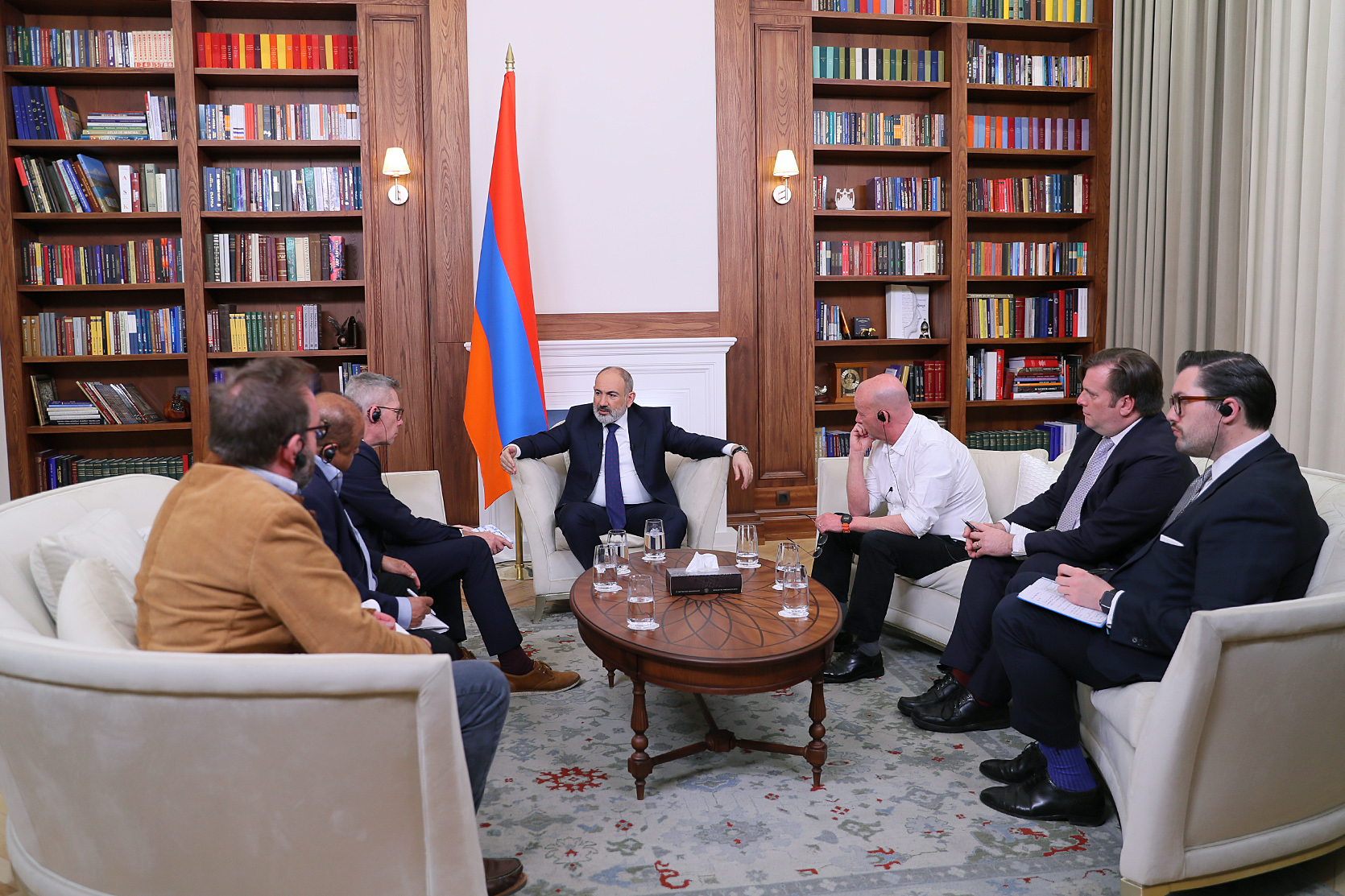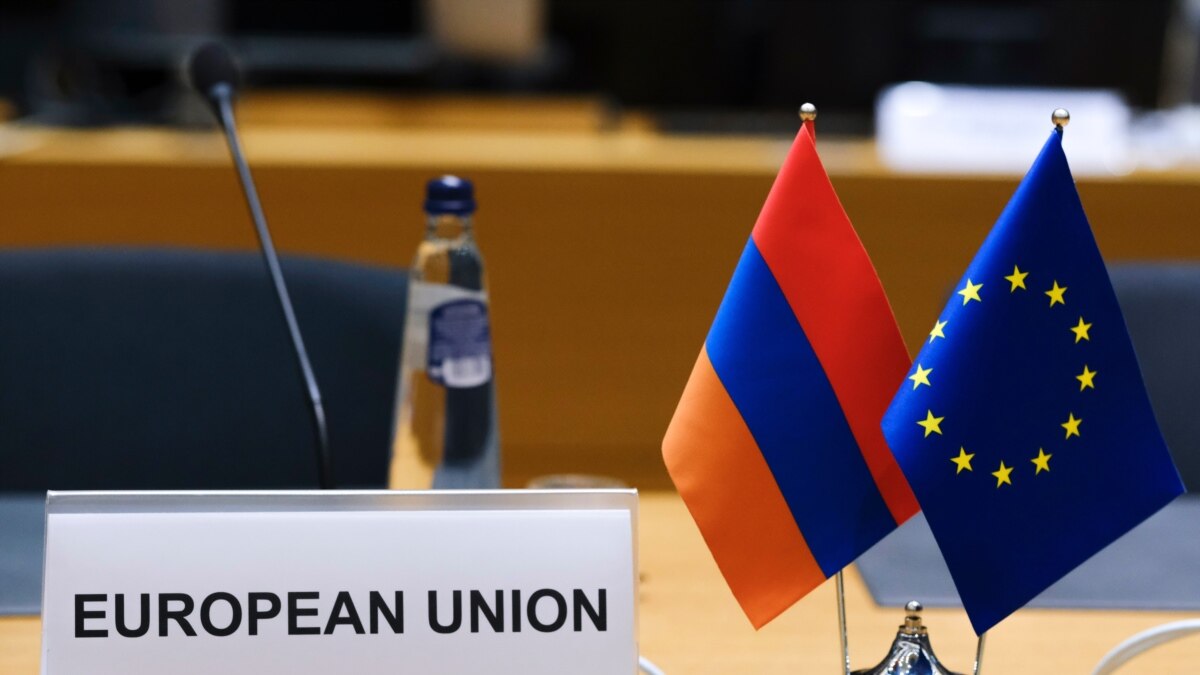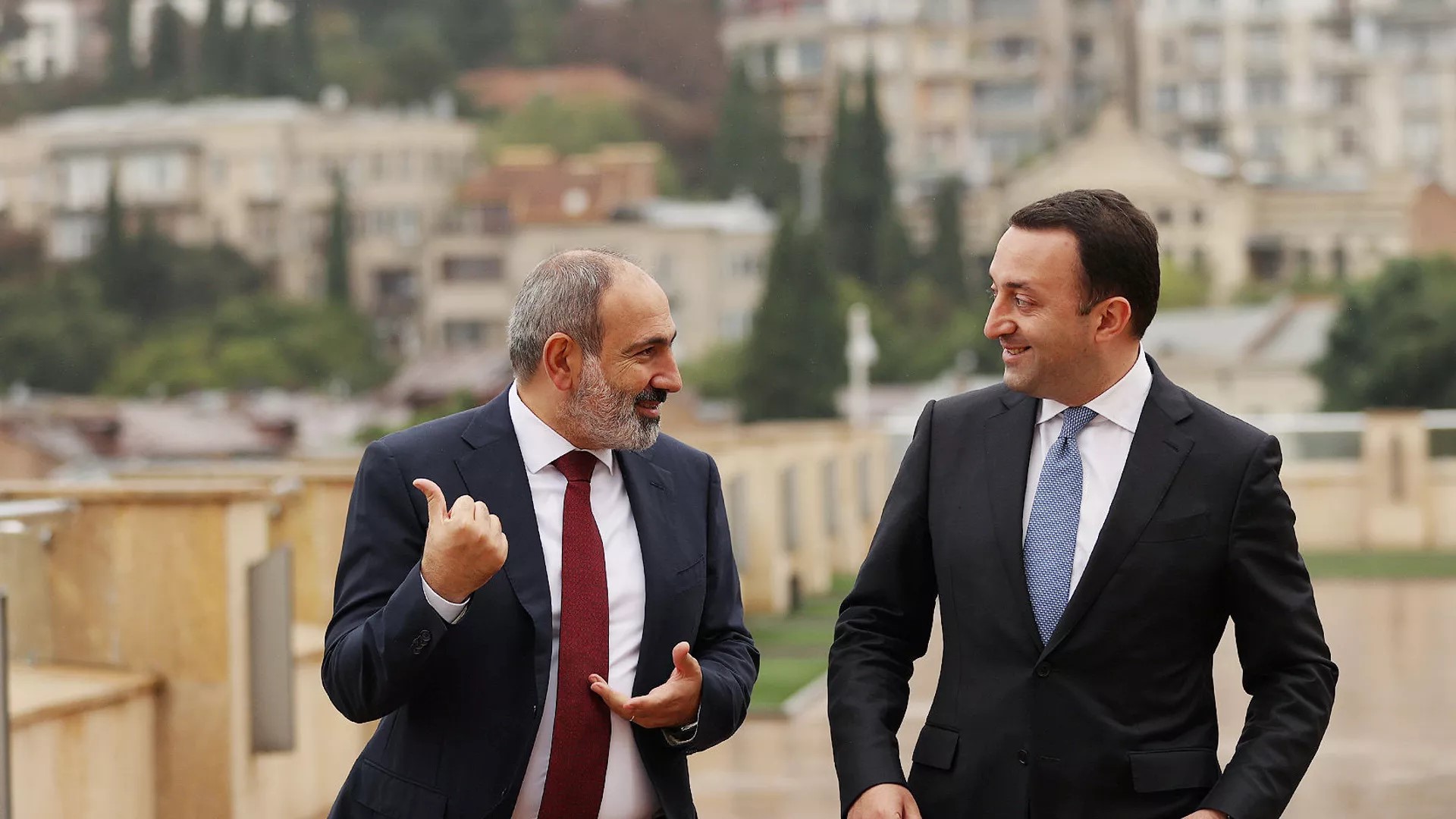Day: October 2, 2024
The Hill
|
Michael_Novakhov shared this story from |
The 2024 presidential race has seen enough shocking events transpire in a few short months to fill an entire calendar year, but that doesn’t mean there won’t be a much-talked about October surprise looming in the final weeks of the campaign.
Each of the past two presidential cycles have been marked by an October surprise, including the “Access Hollywood” tape along with the Comey letter in 2016 and then questions around a laptop belonging to Hunter Biden in 2020.
Here are five potential October surprises that could emerge this year.
The emergence of new video or audio
Each of the last two presidential elections have been marked by the emergence of new audio or video footage through news reports.
In 2016, it was the “Access Hollywood” tape in which Trump was heard bragging about groping women, which nearly ended his White House bid that year. In 2020, it was the Hunter Biden laptop that featured controversial images of President Biden’s son.
For Harris, the risk of new audio or video coming to light centers around her past policy positions.
News outlets have been focused on some of the policies Harris backed during her 2020 presidential bid, when she said she supported a ban on fracking and backed decriminalizing illegally crossing the border. Additional audio or video of her as a presidential candidate, prosecutor or senator could cause new headaches for her campaign. She has distanced herself from those views during the 2024 campaign.
Sign up for the Morning Report
The latest in politics and policy. Direct to your inbox.
By signing up, I agree to the Terms of Use, have reviewed the Privacy Policy, and to receive personalized offers and communications via email, on-site notifications, and targeted advertising using my email address from The Hill, Nexstar Media Inc., and its affiliates
Trump’s ability to shock the general electorate has waned over the near decade he’s spent in the political spotlight with each incendiary comment he makes at rallies and on social media.
Even in 2016, Trump managed to quickly recover from the “Access Hollywood” scandal in a matter of days.
But video and audio of closed-door remarks by Trump to donors, for example, could create a firestorm or provide fodder for the Harris campaign, such as when the former president promised wealthy donors tax cuts in a potential second term.
The significance of a damaging news report was on display last month when CNN reported on posts North Carolina GOP gubernatorial candidate Mark Robinson, whom Trump endorsed, made on an online pornography forum between 2008 and 2012, including that he supported slavery and called himself a “Black Nazi.”
A major weather event
The devastation of Hurricane Helene in recent days was a prime example of how a significant weather event could upend the campaign in the coming weeks.
Helene ravaged swaths of Florida, Georgia and North Carolina, taking out critical infrastructure and cutting off power for millions of people in those states. White House homeland security adviser Liz Sherwood-Randall told reporters Monday as many as 600 people were still unaccounted for.
The political impacts were immediate: Harris cut short a West Coast campaign swing to return to Washington, D.C., for a storm briefing. She is expected to tour storm damage in the coming days, while Trump visited Georgia to see the aftermath Monday.
There is also the possibility that the storm damage could hinder early voting, particularly in North Carolina and Georgia, where early in-person voting is set to begin in the coming weeks. Both of those states are closely contested and are expected to help determine the winner of November’s election.
Hurricane season lasts into November, leaving open the possibility of another major storm along the Gulf Coast. And White House officials in particular have warned that climate change has led to more damaging, more intense storms that could wreak havoc on the campaign.
More political violence
One of the gravest potential October surprises would be violence targeting candidates, election workers, staff or other officials.
Trump has been at the center of two attempted assassinations in recent months, ratcheting up fears of political divisions turning to violence. He was grazed by a bullet at a July rally, and an alleged gunman camped out along the perimeter of one of his golf club’s in September before a Secret Service agent fired at him.
A Virginia man was arrested in late July for allegedly making death threats against Harris.
NBC News reported in September that the FBI was investigating after election officials in at least six states received suspicious packages.
“I’m most concerned about vote-counting and election judges and violence. There’s been a pretty clear pattern of threats about who gets to count votes,” John Murphy, a professor at the University of Illinois who studies political rhetoric, said in a recent interview.
But calls to lower the political temperature after each of those assassination attempts have mostly been futile, with Trump in particular ramping up the personal attacks on his opponents.
On Monday, the former president blamed Democrats for Secret Service staffing issues that forced him to relocate a Saturday rally in Wisconsin.
Another Trump-Harris debate
Perhaps one of the likeliest events that could shake up the presidential race would be a second debate between Trump and Harris.
The two candidates squared off on stage Sept. 10, but Trump has thus far declined to agree to a second debate, claiming he won their first clash and later suggesting it was too late for another one because early voting had already started.
Harris has repeatedly pushed for another debate with Trump in October. She has accepted an invite for a CNN-hosted debate Oct. 23.
But some Trump allies have urged him to reconsider, and there is a lingering sense that the former president could still change his mind if he feels his poll numbers could use a boost or he needs to change the news cycle in the weeks before Election Day.
“As of right now this is the only debate that is left on the calendar. President Trump has made it pretty clear where he is,” senior Trump adviser Jason Miller said Monday, referring to this week’s vice presidential clash. “There were other opportunities that Kamala Harris could have joined President Trump for previous debates.”
Broader war breaks out
While domestic events are most likely to have the most impact on the election, the risk of war breaking out abroad could also have serious ramifications on the campaign.
There are significant concerns about tensions in the Middle East, where Israel’s war with Hamas is approaching its one-year mark.
Separately, Israel decimated Hezbollah’s leadership with strikes over the past week, while also killing hundreds of civilians and forcing nearly 1 million people from their homes in Lebanon.
Israel reportedly told the White House on Monday it could launch a limited ground operation in Lebanon in the coming days, escalating fears of an all-out war between Israeli forces and Hezbollah, designated by the U.S. as a terrorist organization.
Such a war could further inflame tensions among Democrats in particular, as the party has been divided over the Biden administration’s support for Israel over the past year despite its forces killing tens of thousands of Palestinian civilians in Gaza in its war against Hamas.
It would also create a potential opening for Trump to go on offense on foreign policy. While Harris has argued Trump can’t be trusted to maintain alliances and that he has cozied up to dictators, the former president has pointed to conflicts in Ukraine and in the Middle East to argue the world is less safe than it was when he was in office.
Copyright 2024 Nexstar Media Inc. All rights reserved. This material may not be published, broadcast, rewritten, or redistributed.

Bike paths and bike parking in Baku
In preparation for the 29th session of the Conference of the Parties to the UN Framework Convention on Climate Change (COP-29), which will take place in Azerbaijan this November, Baku is creating infrastructure for bicycles and scooters.
“Of course, it’s great to use bicycles and scooters as transportation in Baku, just like in European cities. It’s both a convenient and environmentally friendly mode of transport. The infrastructure for this is already being developed. Although the new bike lanes and parking facilities are not entirely convenient yet and there are still some issues, it’s encouraging that the process has started,” cyclist Karim says.
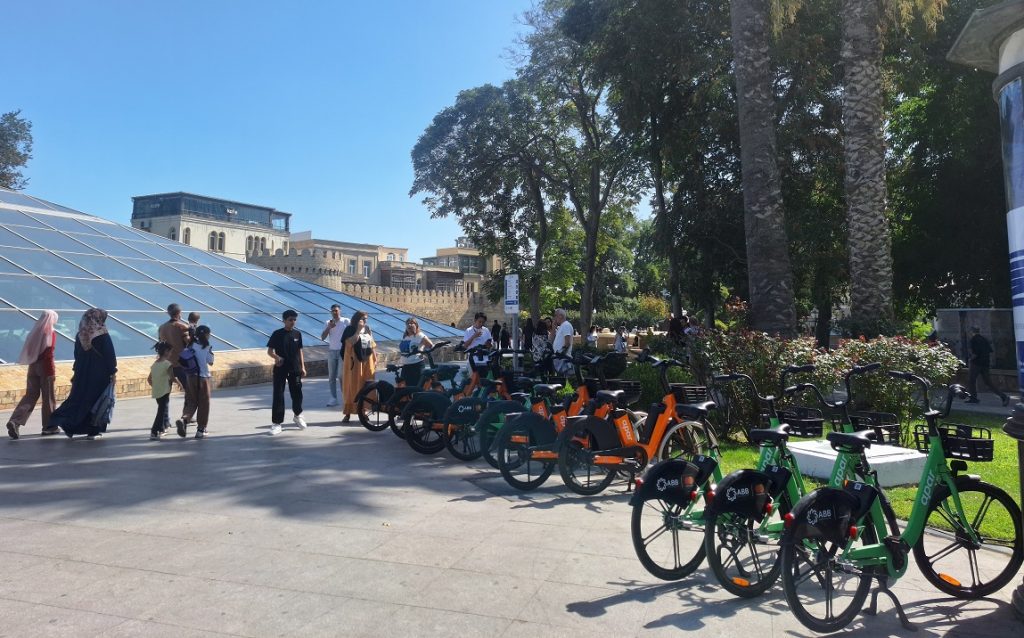
In August 2024, Azerbaijan launched its first-ever bike-sharing service. Around 50 bike parking stations have been set up, mainly on the central streets of Baku. These stations are also equipped with information boards explaining how to rent a bike. To activate and deactivate the bike you’d like to rent, as well as to view nearby parking spots, users can connect to a specially developed mobile app by scanning a QR code displayed on the information boards.
Pedestrians and cars on bike lanes that end halfway
In the initial stage, AYNA (Azerbaijan Land Transport Agency) laid a 10-kilometer bike lane in the city. But cursory observation is enough to see pedestrians and cars using the bike lane.
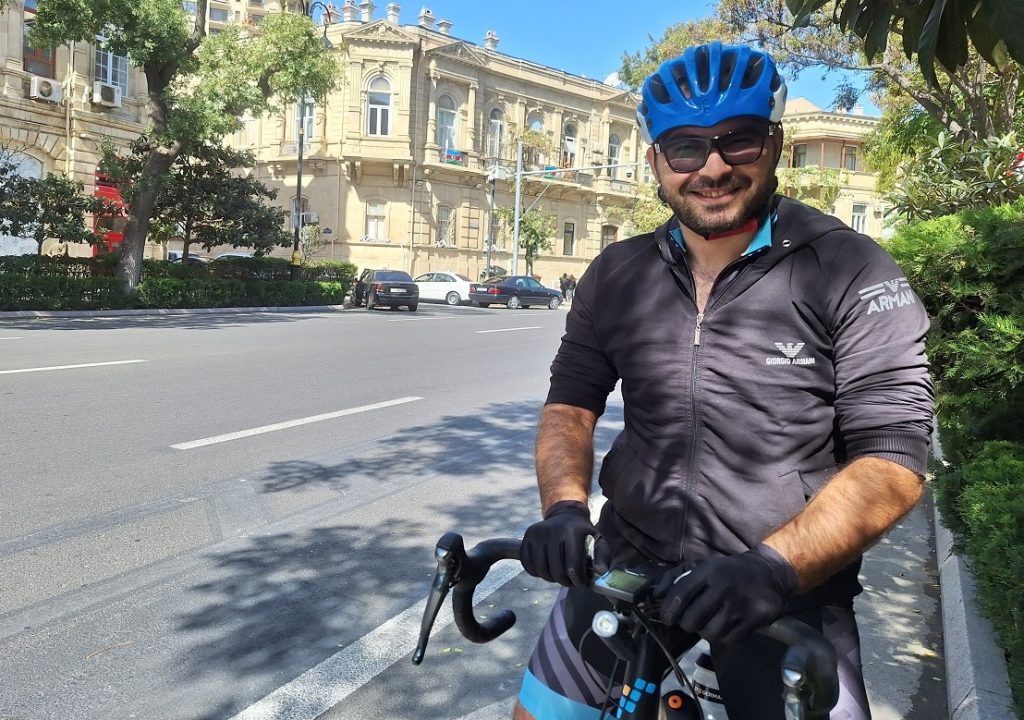
“When we’re cycling, pedestrians or cars suddenly appear in front of us. This poses a danger to cyclists. But sometimes I can’t blame the drivers because Baku isn’t structurally a very suitable city for bike lanes. The roads are already narrow, and now part of the road is taken up by bus lanes, and another part by bike lanes. When the roads are congested, sometimes car drivers end up on the bike lanes.
Another issue is that the lanes abruptly end. For example, I ride down from Icherisheher, and suddenly, the road just stops. Okay, I got here by bike, but how am I supposed to continue?
What I’m trying to say is that promoting cycling, bike rental services and so on is great, but it would be better if these lanes were mainly drawn on highways and were continuous,” says Abbas, a cyclist of many years.
An hour-long bike ride costs over 14 manats
“I rented a bike for 30 days and paid 12 manats [about $7]. The pay-as-you-go rental is not cost-effective. I can’t recall exactly how many qepiks I paid per minute, but I know it was expensive. The monthly plan is good, but I wish the daily riding time under this plan would be increased to at least two hours. One hour a day is too little,” says another cyclist.
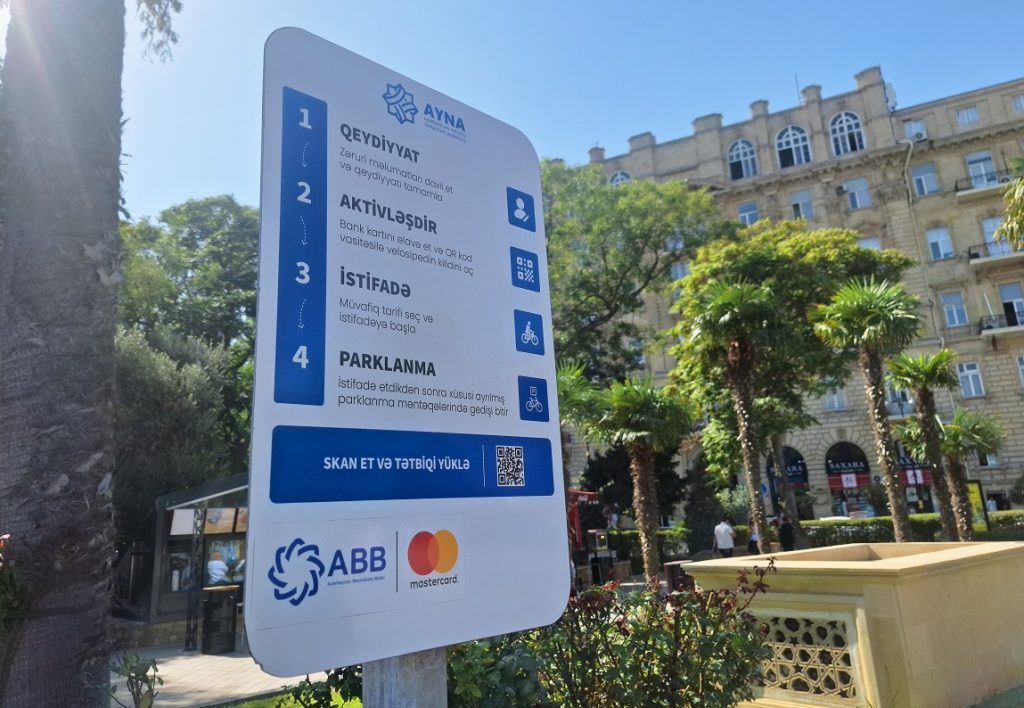

According to the APAR app on the display at the bike parking in front of the “Icherisheher” metro station, bike rentals are available for either 30 or 365 days. Renting a bike for a month costs 36 manats (around $21) with insurance and 12 manats without insurance. The annual rental costs 108 manats (around $63). With either monthly or yearly rentals, you can ride the bike for just one hour a day.
Additionally, bikes can be rented outside these rates by simply activating them, but hourly or minute rates are not specified. In this case, you’ll only find out the cost of your ride upon returning the bike.
To check the rates, I activate one of the bikes at the parking lot and set off. During my short journey, I encounter several inconveniences: cars sometimes enter the bike lane, the lane suddenly ends, and on narrow roads it’s challenging to avoid collisions with oncoming cyclists.
My trip lasts just 13 minutes, and when I return the bike, I have to pay 3 manats and 12 gapiks (around $1.90). This means that one hour of bike riding costs 14 manats and 40 gapiks (around $8).
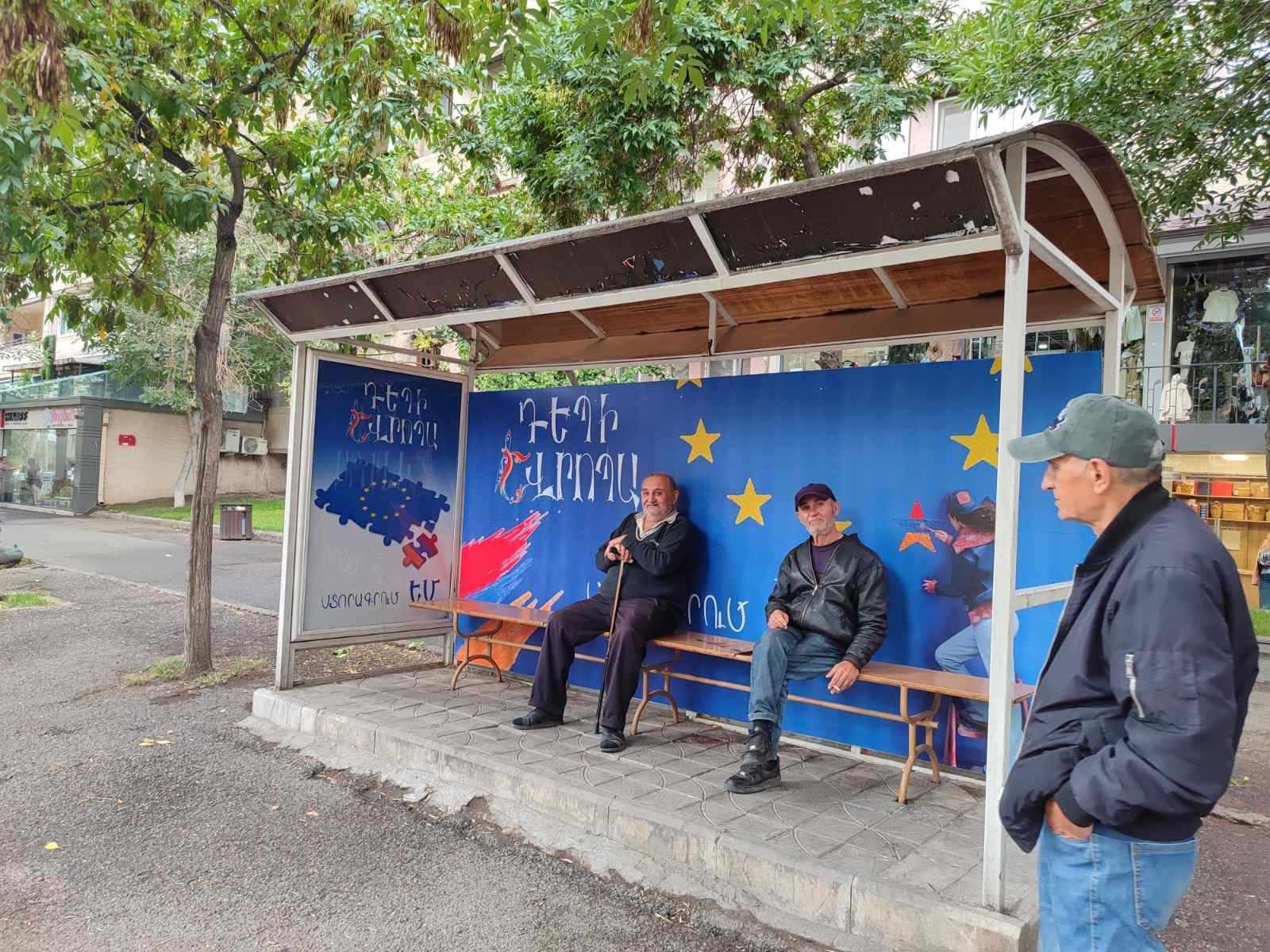
Signature collection in Armenia
Since September 16, signature collection has been underway in all municipalities of Yerevan and regions of Armenia on the issue of holding a referendum on EU membership. The initiative comes from the “Democratic Forces Platform,” formed by pro-Western political factions. The organizing group presented the results of the first 15 days of the signature collection.
“We already have 27,560 signatures, which amounts to 55.12% of the 50,000 signatures we need to bring the issue to the parliamentary agenda,” said Hovsep Khurshudyan, a member of the initiative group, during a press conference.
According to him, the majority of those who expressed support for holding the referendum are residents of Yerevan (58.5%). He positively assessed the pace of signature collection in the first two weeks, noting that the constitution allows for 60 days to complete the process.
- “Armenia has the prospect of becoming a member of the European family,” – Cyprus defense minister
- “Visa granted, but denied entry to the Schengen area”: Stories of Armenian citizens
- Armenia discusses plans for holding a referendum on EU accession
The issue of holding a referendum on EU membership has been actively discussed in Armenia for several months. At the end of June, parliamentary hearings on this issue were even held. However, the ruling team considers these discussions premature. Their stance is explained by the fact that “the referendum is the final stage in the membership process,” and Armenia has not yet submitted an official application to join the European Union.
In response, extra-parliamentary political forces advocating for European integration appealed to the Central Election Commission in early September, requesting permission to start collecting signatures for the EU membership referendum.
The initiative group must collect 50,000 signatures to present their proposal for discussion in the National Assembly. If the ruling majority votes against the bill submitted by the initiative group in parliament, they will need to gather 300,000 signatures to bring the issue back to the parliamentary agenda. Again, 60 days will be allotted for this stage. However, individuals who have already expressed their position in the first stage will not be able to participate in the second phase of signature collection.
The initiative group plans to collect all signatures within a month
According to Hovsep Khurshudyan, a member of the initiative group and a political analyst, the necessary 50,000 signatures can be collected within 30 days, rather than the allotted 60. In this way, Armenian society will demonstrate “its will, determination, and active stance on the matter.”
The initiative group consists of 51 members. One of the group members, lawyer Artak Zeynalyan, also believes it is important to complete the signature collection as soon as possible:
“Events around us are unfolding at an accelerated pace. The sooner we can submit this bill to the National Assembly, the better our chances. People are using legal mechanisms to express their position and will. They are not seizing government buildings or blackmailing authorities. Therefore, the parliament is obligated to fulfill its duties and ensure the issue is discussed. This is a civilized and lawful process. People are freely expressing their will and their right to freedom of expression, participating in national and local governance.”
“The authorities’ position is one of passive waiting”
According to Khurshudyan, Armenia’s authorities are in a state of passive anticipation:
“They are neither saying ‘yes’ nor ‘no.’ The authorities are currently waiting for the outcome of certain international events, including the results of elections in Georgia and the U.S. After that, they believe it will be easier for them to decide — whether to accept or reject this bill.”
In the meantime, the political analyst believes that Armenia needs to position itself and declare its course on the international political stage now.
Hovsep Khurshudyan urged the authorities not to tie the process they initiated to foreign policy events.
Two different referendums — before and after
According to the initiative group’s representative to the Central Election Commission, lawyer Artak Zeynalyan, their legislative initiative is only meant to announce the start of Armenia’s EU accession process.
He emphasizes that this referendum does not replace the one that will need to be held later, at the time of signing an international agreement.
“Of course, a membership application must be submitted, followed by the process of alignment and convergence with EU standards. Only after that it will be possible to obtain candidate status. And then, when an international agreement is signed, it will need to hold a referendum with the question: ‘Do you agree to join the EU?’” he explained.
The lawyer assures that the bill, authored by him personally, “does not create any obstacles to Armenia’s future path and ensures flexibility.”
Follow us – Twitter | Facebook | Instagram
Signature collection in Armenia


